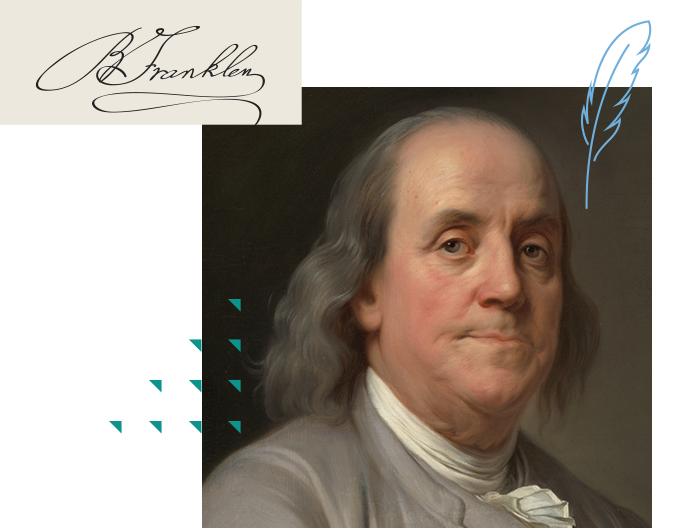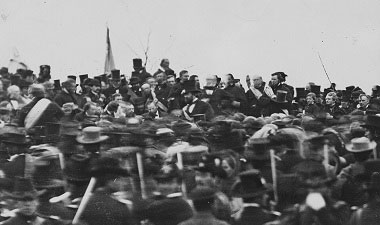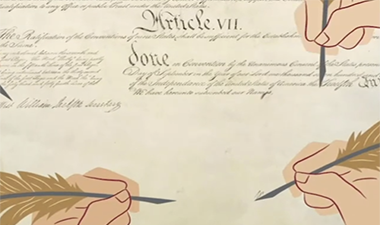Summary:
Benjamin Franklin was active in public affairs, politics, business, and a celebrated writer and inventor. After signing the Declaration, he served as a diplomat and a delegate at the 1787 Constitutional Convention.
Benjamin Franklin | Signer of the Declaration of Independence and the Constitution
6:42
Biography
Benjamin Franklin was born in Boston, the son of tallow handler, soaper, and candlemaker Josiah Franklin and Abiah Folger Franklin. His father had 17 children from his first wife and Benjamin’s mother; Ben was his mother’s eighth of ten children. Josiah Franklin did what he could to see that Ben was educated, but he could only afford to give him two years at the Boston Latin School. From age ten onward, Franklin educated himself. At 12, he was apprenticed to his older brother James, a printer, and thus learned the printing trade. James was clearly ambitious, and three years after Ben arrived at his print shop he founded the third newspaper of Boston, The New-England Courant.
Ben, equally ambitious, was soon sending letters to the newspaper, claiming to be a middle-aged widow named Silence Dogood. James was not happy when he learned, finally, that his apprentice brother was the author of the Dogood letters. Tensions between the brothers prompted Franklin to run away before his apprenticeship term had ended. At the age of 17, he was technically a fugitive.
Franklin’s destination was Philadelphia, the largest of the colonial cities and home to several print shops and newspapers. One of Franklin’s first acts was to propose marriage to the daughter of the boarding house operator where he found lodgings. Deborah Read was only 15, and her mother refused to allow the marriage. Later, in 1730, the two would establish a common law marriage. Deborah Read Franklin agreed to raise Franklin’s illegitimate son William along with her two children.
In 1728, Franklin set up his own printing house, and in 1729 he published The Pennsylvania Gazette, filling it with essays and observations focused on local reforms. His dream, which he partially fulfilled, was to create an intercolonial network of newspapers. By 1753, eight of the fifteen English language newspapers in the colonies were published by Franklin or his partners.
In 1732, Franklin achieved considerable fame by publishing Poor Richard’s Almanac under the pseudonym Richard Saunders. The almanac, filled with folksy proverbs like, “Fish and visitors stink in three days,” was an instant success, and he sold about ten thousand copies each year. The almanac established his distinctive style—plain, practical, but with a sly, self-deprecating tone that allowed tongue in cheek wit and satire in pieces like “Advice to a Friend on Choosing a Mistress.”
Franklin was more than a humorist and more than a printer. From his earliest years in Philadelphia, he proved to be a social innovator and community activist. He created the first volunteer firefighting company, a self-improvement club called the Junto, and proposals for a college and a charity school. He embraced the Enlightenment and its emphasis on science, and in 1743 he founded the American Philosophical Society, where men of science could discuss their discoveries and their theories. By the 1740s, he was, in essence, America’s Renaissance man, active in public affairs, in politics, in running a successful business, and as a celebrated writer and inventor. To Franklin, we owe the Franklin stove, bifocal glasses, the lightning rod, and the urinary catheter. Although he never attended college, his achievements brought him honorary degrees from Harvard and Yale in 1753.
In 1757, Franklin was sent to England as a colonial agent of the Pennsylvania Assembly; his mission was to represent the anti-proprietary party in its struggle with the Penn family. While in London in 1765, Franklin made a rare political mistake: he assumed the new Stamp Act would be obeyed and recommended a friend to be stamp distributor. Pennsylvanians were outraged and threats were made to destroy his home in Philadelphia. Realizing the colonists were ready and willing to resist the tax, he went to the House of Commons to testify and to support the act’s repeal. Suddenly Benjamin Franklin became the voice of American interests and views, and three other states appointed him their agents to the Crown. In 1766 he told Parliament that Americans had, indeed, contributed their share to the defense of the empire during its wars with France. By the time he returned home to America, Franklin had won a reputation in England as a troublemaker.
But politics did not consume all his time. His interest in science led him to join a number of English societies devoted to what the 18th century called natural philosophy. His involvement led to an honorary degree from Oxford University in 1762, making a man with little formal education able to call himself Dr. Franklin. Franklin also took advantage of his time abroad to travel to Scotland, Ireland, Germany, and Paris, meeting noted scientists and political leaders and developing a sophistication few colonists enjoyed.
In May of 1775, after his last mission to Britain, Franklin returned to America. By then, shots had been fired at Lexington and Concord, colonial leaders had organized a Continental Congress, and local activists had formed committees of safety and built a communications network across colony lines. When the second Continental Congress met, Franklin was there, representing Pennsylvania. He was appointed to the committee to draft the Declaration of Independence and although Jefferson did most of the writing, Franklin made small but important edits to the document. It is said that, at the signing, Franklin had replied to John Hancock’s comment that the signers must all hang together by saying, “Yes, we must, indeed, all hang together, or most assuredly we shall all hang separately.”
In October of 1776, Congress appointed Franklin as its commissioner for the United States to France. This began his second major diplomatic experience. He took Paris by storm, charming the women who dubbed him “Papa” and impressing the men with his scientific achievements [including his experiments with electricity] and his diplomatic skills. He was successful in securing a military alliance with the French in 1778 and, at war’s end, he helped secure the favorable terms in the Treaty of Paris that ensured American independence.
Franklin returned home in 1785. Next to George Washington, he was the most widely-known and most widely-praised champion of American liberty. He was unanimously elected president of the Supreme Executive Council of Pennsylvania—the equivalent of Governor—and when the Constitutional Convention met to draft a new constitution for the country, he was a delegate. By this time, severe pain caused by gout and kidney and bladder stones limited his participation at the Convention. But history – or historical myth—has recorded his prophetic words to a woman who asked Franklin what kind of government the Convention was proposing. “A republic, madam,” he replied, adding “if you can keep it.”
Franklin had now entered his ninth decade. He was overweight, plagued by gout and kidney stones, and on April 17, 1790, he died of an acute attack of pleurisy. His funeral was attended by almost 20,000 people, and in France, a three-day mourning period was declared. Memorial services were held across America. Preparing for his death, Franklin had composed his own epitaph, although it was not used on his grave stone: It read: “The body of B. Franklin Printer; Like the Cover of an old Book, Its Contents torn out, And stript of its Lettering and Gilding, Lies here, Food for Worms. But the work shall not be wholly lost: For it will, as he believ’d appear once more, in a new & more perfect Edition, Corrected and Amended By the Author.”








